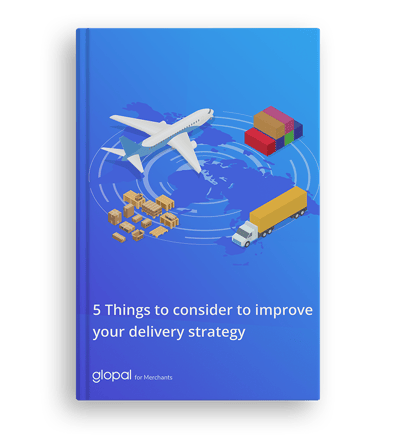As external factors such as the pandemic have been impacting commerce across the world over the last couple of years, the majority of markets have seen a slow down in physical sales growth. Inline with this, Ecommerce grew exponentially over the last couple of years, being estimated to be worth an astonishing $6.5tn by 2023. According to statista, 22% of this will be cross-border.
However, with the growing increase in consumer demand for ecommerce across the globe, a rise in the worldwide pandemic, and the transition effects from Brexit and other regulation changes, global shipping is struggling and it remains a trend that may continue further into 2021.

Download the “5 Things to consider to improve your delivery strategy” guide and prevent your shipping from getting stuck at customs.
Global delivery is an important cog in the ecommerce system. Companies like Amazon and their next day delivery has evolved customer expectations where customers want their purchases now rather than later.
Unfortunately due to a series of events over the last year, shipping has become one of the main challenges for merchants and a constant headache in the struggle to provide an expected customer experience.
So let’s look at what could further impact shipping in 2021:
- Covid19
- Brexit regulations
- New EU tax regulations
Covid19
Covid19 was a huge impact last year for many businesses around the world and essentially slowed all forms of travel and deliveries.
With the closure of many ports and borders worldwide, as well as even more borders introducing tighter restrictions and screening due to the virus, delivery times became substantially longer for a variety of courier services.
With a second lockdown in effect for many EU countries over the Christmas period, cross-border delivery times were greatly increased and merchants had to spend a lot of time and energy to tackle this problem and implement solutions.
As governments introduce more effective measures in 2021, the virus is becoming less impactful on deliveries but merchants still need to be aware of countries where delivery times may be affected more.
Brexit regulations
If Covid19 was one thing, then the impact of brexit has become something else entirely.
When Britain officially left the EU, the changes to regulations and documentation caused a short term problem for shipping and created a major slowdown of parcels moving in and out of the UK. We covered what changes brexit introduced and what merchants need to be aware of in order to sell into and out of the UK/EU in our previous article.
Due to the complex nature and regulations changes that came with Brexit, around 1 in 5 of all parcels having incorrect paperwork resulting in a massive backlog of parcels, a very slow customs process and the bottleneck of delivery trucks we’ve seen over the last month.
The big problem for carriers is that if just one parcel on a truck is lacking the correct paperwork then the whole truck can be held up at the border and indeed potentially turned around and sent back to the depot.
Additionally, carriers delivery systems are complex and are not designed for holding and storing parcels waiting for paperwork to be complete - their systems are built around a conveyor belt sortation systems that are designed to offload parcels and fly them directly to the loading dock for the outgoing trailer. As they create their systems around efficiency to provide a quick and cost effective service for their customers, they have no space in their warehouses to store packages waiting to be sorted and assigned their correct paperwork. This forces the courier to send the parcels back to the merchant, forcing even more bottlenecks across the country.
This complexity created from brexit regulation and customs documentation changes can add up to approximately 2-3 months to delivery times for those parcels which don’t have the right paperwork. This doesn’t just cost the merchant time and money, but potential future sales and possible brand damage from unhappy and disgruntled customers.
New EU tax regulations
Last year the 27 member states of the European Union voted on sweeping reforms to the VAT obligations for B2C e-commerce sellers and marketplaces. This VAT change is set to be implemented from the 1st of July 2021 and affects any merchant trading within the EU.
Their aim is to grow international ecommerce trade between the EU and promote trade across its single digital market by reducing the compliance obligations.
The reform enables merchants to be able to report all of their pan-EU sales on a single VAT return in their home country, instead of having multiple VAT registrations across the EU.
- One Stop Shop EU VAT Return
A One Stop Shop (OSS) EU VAT return will be rolled out. Merchants who are selling their goods to EU customers may opt to use this OSS to report all their EU sales, instead of having to be VAT registered in each country once the merchant passes that country's selling threshold.
Whilst this is predominantly aimed at EU merchants, it is also relevant for UK/US merchants selling into the EU.
This will be implemented on 1st July 2021, so no action is required to be taken until then, which after that point Merchants can start using the OSS system, which is to be paid to their home country’s tax office.
For those non-EU merchants who are using fulfilment centres or stock holding in warehouses in EU states, it’s worth noting that you will have to continue to be foreign VAT registered in those countries.
- Closing the import VAT exemption loophole – import ‘Green Channel’
Additionally to the implementation of the OSS, the €22 VAT exemption on small parcels being imported into the EU will be removed. This exemption has been heavily abused by many sellers mistakenly or deliberately under-declaring the import values of goods to avoid VAT. Instead, VAT must be charged at the point-of-sale for consignments not exceeding €150, which is declared and paid through the IOSS (Import One Stop Shop).
Non-EU sellers will have to register for IOSS in just one EU state to declare the VAT on any affected imports on shipments below €150. This is known as the ‘non-Union scheme’. However, non-EU sellers will require at least one regular VAT registration in one Union member state. If any seller chooses not to use the IOSS, the customer will have to pay the delivery or customs agent to access their goods.
Being aware of these tax regulations are inherently important for US/UK and other EU merchants selling into the EU. Having the correct VAT displayed for your customers when they’re purchasing your products reduces any negative experience of having to pay extra at customs, as well as potential shipping delays.
We will cover more on the new upcoming EU VAT changes, and what merchants need to do over the next few months.
How to overcome these challenges?
There are a lot of external factors that are currently slowing down global delivery, however, there are still things merchants can do to speed along the process and ensure their parcels aren’t stuck at customs and are delivered to their customers.
With all of this in mind, the question is, what can merchants do to overcome these shipping challenges?
We can break it down into 5 areas of focus:
- Duties and Taxes
- Correct documentation
- Commodity & Product HS codes
- Implementing an effective shipping strategy
- Keeping on top of change
By implementing these and keeping up to date, you’ll be able to reduce your delivery times to your customers and create that competitive cross-border advantage.
1. Duties and Taxes
Each market has its own tax and duties requirements. Selling into more than one international country can start to become a confusing problem for newer or smaller merchants who haven’t integrated a full system in place.
And who pays the duties and taxes in the first place? It can be absorbed by the customer in their prices, or by the carrier and customer. Many merchants opt to neglect the taxes, excluding them out of their checkout which then results in the cost being left for the courier and the customer to settle. This is where a lot of problems are created for the merchant.
Customers tend to not want unwarranted surprises during delivery - they come to the checkout with the expectation that once they select the delivery and see the grand total, all hidden charges are included. Once the purchase has made its way through customs, and then becomes blocked due to unpaid taxes and duties, the customer can simply refuse to pay, have the item returned (as an expense to the merchant) and get a refund - leaving the merchant without a sale, incurring more fees due to the extra delivery cost and a lost customer.
This is a challenge and situation both merchants and their customers do not want to face, and a situation that can be easily avoided by not only offering the tax and duties at the checkout, but also the correct amount for that country to create a buyer experience customers have come to expect.
Don’t run the risk of upsetting customers - implement the correct tax and duties at your checkout.
2. Correct Customs documentation
Customs documentation is largely standardized across the EU, they include all the information the target country would want to know about the goods you’re transporting, such as who your business is, what the goods are classified as, how they are being shipped, who is responsible for the customs, etc.
Ensuring documentation is all filled out correctly is essential. Brexit regulations created some changes in the customs documentation required for delivery into the UK, which merchants need to be aware of.
This whole process can be automated once you’re registered with the local tax authorities of each market, but it’s advisable to get professional help when doing it for the first time as any errors may lead to undelivered goods and/or a very bad customer experience.
3. Commodity & Product HS codes
HS codes are required for important and exporting goods and one of the key requirements for customs declarations. Commodity codes are used to help customs identify what your products are. Harmonized System (HS) values are used to classify products for customs import duty and tax through the application of codes to each product you transport.
Countries want to know what your products are but this also helps to charge the correct tariffs and ensure you don’t overpay for importing products and your customers don’t overpay for tax and duties. These numbers help to determine what your products are, the materials they’re made from and it’s very important to do this. If you have a wide variety of products, it can become quite laborious to classify all products and keep up to date with the codes, however Glopal does provide an automated service that classifies all existing and new products, giving you ease of mind.
Your products need to be classified with HS codes correctly to avoid any customs and delivery issues, as well as VAT problems. Not only is getting parcels stuck in customs going to give a negative experience to your customer, but risking fines for incorrect VAT payments further down the line isn’t nice and can be avoided.
4. Implementing an effective shipping strategy
Having a correct shipping strategy and solutions in place is necessary to prevent friction for you and your buyer as well as being able to deliver into all of your chosen markets. This includes adding the additional requirements into your shipping process,
i.e How will duties be handled? will they be collected on delivery? And how is this cost reflected to your buyers? Also how will you share necessary data with respective carriers such as HS codes and customs declarations? There are a lot of fundamental components to integrate into your shipping process.
We’ve put together a list of tips that can help you improve your delivery strategy
5. Keeping on top of change
The more international markets you sell into, the more susceptible you are to constant change. Customs are a dynamic process - it is forever adapting and changing for every market and international policies evolve over time. Brexit regulations changes and VAT changes that will be implemented for anyone selling into the EU are a good example of a dynamic process that can severely restrict a merchants cross-border trade capabilities if not met quick enough.
3 years ago concerns and warnings were raised about the impact of brexit, many people didn’t believe those warnings, didn’t anticipate the impacts or plan a contingency and now there’s a sizable shipping issue in the UK with delivery parcels being blocked. This is causing many merchants to lose business.
When countries are constantly changing rules all the time, what merchants need to do is firstly be aware of new regulations that are going to be affecting the markets they sell into. Merchants want to be up to date to stay ahead of the market and prevent any unwanted issues, however considering ecommerce is always changing, it can be difficult to keep up.
The key is to not constantly catch up - as this can be time consuming and ultimately costly, but find an ecommerce partner who can do all this - including ever evolving tax and duties calculations, keeping you up to date with individual market rules changes, injecting these constant changes into operations and into parcel carriers within the right format to name a few.
This is where Glopal can help.
Glopal’s ecommerce solution enables merchants to not only keep up to date with all the constant changes in their markets, but provides a global delivery process that can help overcome shipping challenges and enable you to sell into international markets hassle-free.
We manage every step in the global ecommerce process from discovering international markets and international buyers for your products, automatic HS product classification, tax & duty calculation, through to customs documentation and shipping label generation and returns.
Our tailored ecommerce solution is designed to manage your entire international process, enabling you to sell into any international market.
We can help you to launch into the EU, UK and US markets:
- Identify top international markets for your products.
- The solution localises the product feeds into over 25 currencies, providing buyers with the same local experience they’d expect.
- Glopal’s guaranteed total landed cost reduces international delivery times and includes all customs duty and tax. Glopal's ‘Delivery Duty Paid’ solution integrates seamlessly with your existing checkout.
- Glopal’s automated HS classification and customs declaration enables you to classify all your products and keep up to date. It offers a prohibited items check that automatically identifies restricted and prohibited items for export to specific destinations and informs the buyer in order to prevent delayed or failed shipments. This verification can also be performed offline and full product catalogs can be processed via our API.
- Glopal’s international shipping creates a seamless and simple process, enabling merchants to ship their products overseas at a cost effective & competitive rate, whilst also providing a streamlined, hassle-free returns option.
To overcome global shipping challenges and stay ahead of the international changes, get in touch with one of our ecommerce experts today.






